Introduction
With so many magnesium supplements available, it can be overwhelming to choose the right one for your needs. The key is to find a form of magnesium that is easily absorbed by the body. Some well-absorbed forms include amino acid chelate, citrate, glycinate, and aspartate. Each of these forms has its own benefits and can be suitable for different purposes. For example, magnesium chelate is gentle on the stomach and well absorbed, making it a good option for those looking for a high-quality magnesium supplement. On the other hand, magnesium citrate is highly bioavailable and can help with cellular energy production, making it ideal for relieving aches and pains. Determine your specific needs and choose the magnesium supplement that aligns with them.https://www.youtube.com/embed/HPuQD5-cVUo
Key Takeaways
- There are various forms of magnesium supplements, including amino acid chelate, citrate, glycinate, and aspartate, each with its own benefits and levels of bioavailability.
- The form of magnesium selected is crucial for its absorption and effectiveness in the body; it’s essential to choose a type that aligns with individual needs.
- General guidelines for magnesium supplementation recommend a daily dose of 200-400mg for adults, with specific RDAs varying by age, sex, and life stage.
- Magnesium offers numerous health benefits, including supporting bone and heart health, improving sleep quality, and managing anxiety and stress.
- It’s essential to be aware of potential side effects of magnesium and its interactions with other medications to ensure safe supplementation.
Magnesium, an essential mineral, has piqued the interest of wellness enthusiasts. With various forms and brands in the market, choosing the right magnesium supplements can be a daunting task. This comprehensive guide dives into the world of magnesium, elucidating the benefits it brings to our health – from bone fortification to heart function enhancement.
However, not all magnesium supplements are created equal. It’s vital to discern the best magnesium for your unique needs. Factors like bioavailability, the specific health goal in mind, and any existing health conditions can influence this choice.
Moreover, understanding the correct magnesium dosage is crucial to reap its advantages without falling prey to unwelcome side effects.
Magnesium supplements have surged in popularity over recent years, and for a good reason. This vital mineral plays a pivotal role in numerous bodily functions, ranging from energy production to nerve function. As the demand grows, so does the myriad of options available in the market. Discerning the best magnesium supplement that aligns with your health goals and dietary needs is paramount. Alongside understanding the benefits, being aware of potential side effects and recommended dos
What magnesium would be best for me?
Choosing the right form of magnesium can greatly impact the effectiveness of supplementation. With so many options on the market, it can be overwhelming to know which one is best for you. In this article, we will discuss the different forms of magnesium available, their benefits, dosage recommendations, potential side effects, and interactions with other medications. By understanding the various factors to consider when selecting magnesium, you can make an informed decision about which form is best suited to your individual needs.
Amino acid chelate
Amino acid chelate is a form of magnesium that is bound to an amino acid molecule. This binding allows for enhanced absorption and transport of magnesium throughout the body. Amino acid chelate is one of the most well-absorbed forms of magnesium available.
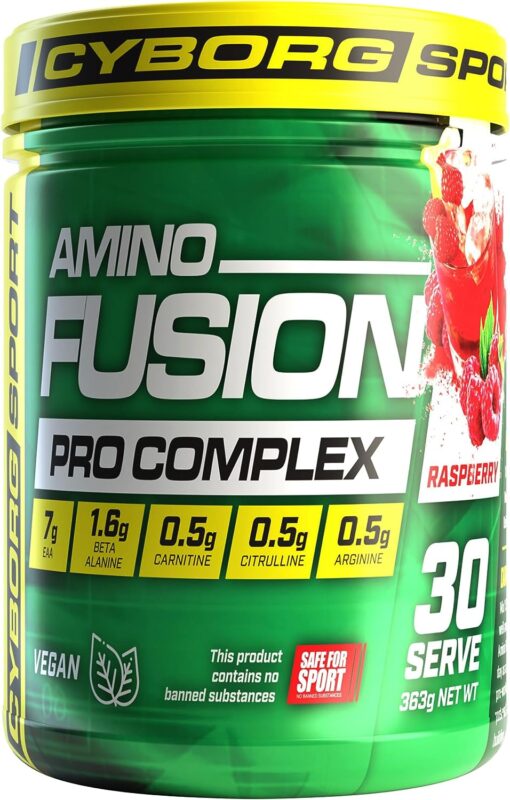
Photo: Amazon
When choosing amino acid chelate, you can expect a high level of bioavailability, meaning that your body can easily utilize and benefit from this form of magnesium. Additionally, amino acid chelate is known to be gentle on the stomach, making it a suitable option for those with digestive sensitivities.
- Enhanced magnesium absorption due to its bond with amino acids.
- Gentle on the stomach, reducing digestive discomfort.
- Supports muscle health and function.
- Can aid in nerve function and transmission.
- May help with sleep regulation by calming the nervous system.
- Digestive disturbances, though less frequent than other forms, can include mild diarrhea or stomach upset.
- A feeling of drowsiness or fatigue if taken in excessive amounts.
- Some individuals might experience a flushing sensation or skin warmth.
Citrate
Citrate is another widely available form of magnesium. It is formed when magnesium is bound to citric acid. Citrate has good bioavailability and is well-absorbed by the body. This form of magnesium is often used to support cellular energy production.
- Diarrhea, especially if taken in larger doses, due to its laxative properties.
- Stomach cramps or discomfort might occur in some individuals.
- A potential decrease in blood pressure, causing dizziness in some cases.

Photo: Amazon
If you choose citrate as your preferred form of magnesium, you can expect a moderate level of bioavailability and absorption. It may be a good option for individuals looking to support their energy levels and overall cellular function.
- Promotes cellular energy production due to its good bioavailability.
- Can act as a mild laxative, aiding digestion.
- Supports cardiovascular health, including heart rhythm regulation.
- Assists in bone density maintenance.
- Might alleviate symptoms of magnesium deficiency, like fatigue.
- Might cause drowsiness or fatigue in some people, especially when taken in higher amounts.
- Occasional digestive disturbances such as soft stools, though less frequent than other forms.
- Headaches or migraines in rare cases.
Glycinate
Glycinate is a form of magnesium that is bound to glycine, a non-essential amino acid. This form of magnesium has excellent bioavailability and absorption, as glycine helps facilitate its transport across the digestive tract.
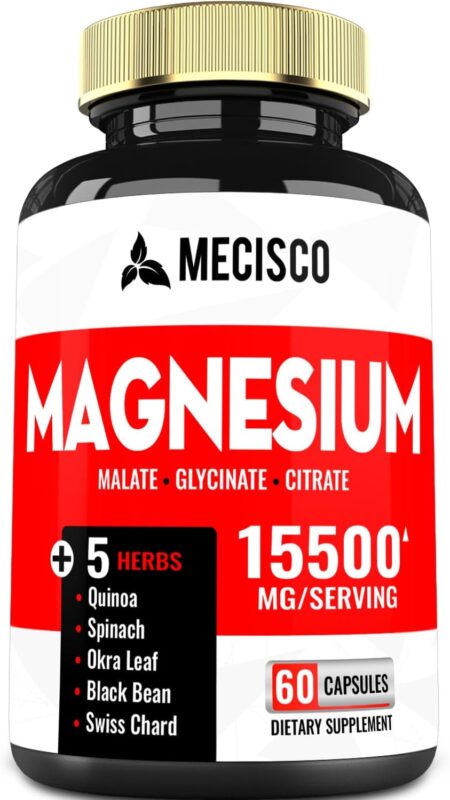
Photo: Amazon
By selecting glycinate, you can benefit from its high level of bioavailability and absorption. Glycinate is a popular choice for individuals looking to relieve sore muscles and improve muscle recovery post-exercise.
- Exceptional bioavailability ensures efficient magnesium intake.
- Promotes muscle recovery, making it popular among athletes.
- May reduce symptoms of anxiety and depression.
- Less likely to cause digestive disturbances, even in higher doses.
- Supports cognitive function and mood stabilization.
- Overconsumption might lead to an overstimulated nervous system, causing anxiety or restlessness.
- Digestive disturbances such as diarrhea or stomach upset, though less common.
- In rare cases, a tingling sensation in the extremities.
Side Affects Considerations
Aspartate
Aspartate is a form of magnesium that is bound to aspartic acid, an amino acid. Like the other forms of magnesium discussed, aspartate offers good bioavailability and absorption.
Choosing aspartate as your preferred form of magnesium allows for effective utilization by the body. This form of magnesium may be particularly beneficial for individuals looking to support overall well-being and maintain healthy magnesium levels.
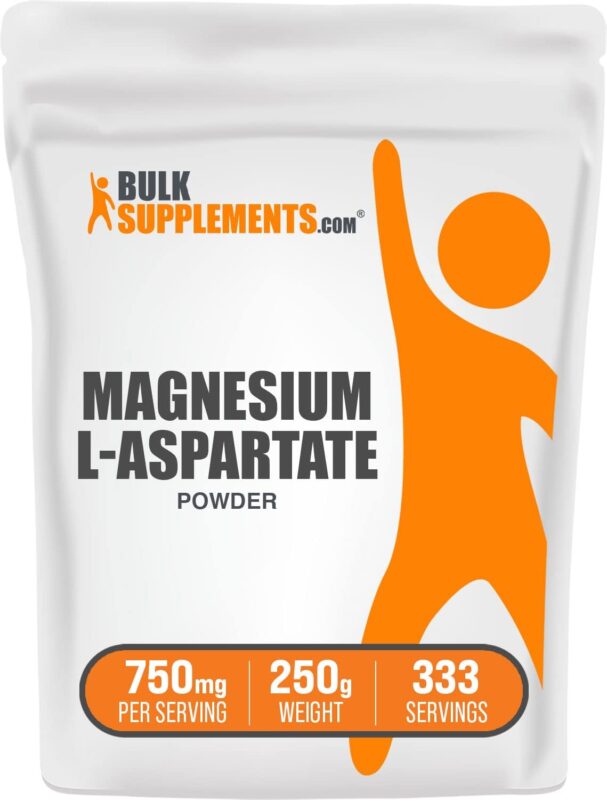
Photo: Amazon
- Good bioavailability allows for effective magnesium utilization.
- Assists in energy production and metabolic functions.
- Might help with memory and brain health.
- Supports cellular communication and signal transmission.
- Can assist in maintaining overall body magnesium balance.
Importance of choosing the right form of magnesium
The form of magnesium you choose plays an essential role in its absorption and utilization by the body. Magnesium needs to be bound to a carrier molecule, such as an amino acid, to ensure efficient absorption and transport.
Different carrier molecules can affect the bioavailability and utilization of magnesium. Some forms of magnesium are more easily absorbed and utilized by the body than others. Therefore, it’s crucial to select a form of magnesium that suits your individual needs and preferences.
Factors to consider when selecting magnesium
When selecting magnesium, there are several factors to consider to ensure you choose the best form for your specific needs. These factors include individual nutritional needs, health conditions and symptoms, interactions with other medications, and potential side effects.
Individual nutritional needs can vary, and it is important to consider any specific dietary requirements or deficiencies when choosing a magnesium supplement. If you have any specific health conditions or symptoms, it is advisable to consult with a healthcare professional who can provide personalized recommendations.
Additionally, it is essential to be aware of any potential interactions with other medications you may be taking. Some medications can interact with magnesium, affecting its absorption or effectiveness. Lastly, it is important to familiarize yourself with the potential side effects of magnesium supplementation.
Dosage recommendations
When determining the appropriate dosage of magnesium, it is important to consider the guidelines provided by healthcare professionals and regulatory authorities. General guidelines for magnesium supplementation recommend a daily dose of 200-400mg for adults.
The recommended daily allowance (RDA) for magnesium varies depending on age, sex, and life stage. For example, the RDA for adult males is 400-420mg, while for adult females, it is 310-320mg.
It is important to note that individual needs may vary, and dosage adjustments may be necessary based on specific conditions or circumstances. Consulting with a healthcare professional can help ensure you are taking the appropriate dosage for your needs.
Common benefits of magnesium
Magnesium offers a wide range of benefits for overall health and well-being. Some common benefits of magnesium supplementation include supporting bone health, promoting heart health, improving sleep quality, relieving muscle cramps and spasms, and managing anxiety and stress.
Magnesium plays a vital role in maintaining healthy bones and teeth. It helps with calcium absorption and bone formation, making it essential for bone health. Additionally, magnesium supports heart health by promoting normal heart rhythm and supporting blood pressure regulation.
Furthermore, magnesium can improve sleep quality by helping regulate neurotransmitters and hormones involved in sleep-wake cycles. It can also help relax muscles and relieve muscle cramps and spasms.
Lastly, magnesium has been shown to have a positive impact on anxiety and stress management. It helps regulate neurotransmitters involved in mood and can promote a sense of calm and relaxation.
Potential side effects of magnesium
While magnesium is generally safe for most individuals, some potential side effects may occur with excessive intake. Common side effects include diarrhea, nausea, and abdominal cramping. These side effects can usually be resolved by adjusting the dosage or switching to a different form of magnesium.
It is important to note that individuals with certain health conditions, such as kidney disease or heart disease, may need to exercise caution when taking magnesium supplements. Additionally, individuals taking medications should consult with a healthcare professional to ensure there are no potential interactions or contraindications.
Interactions with other medications
Magnesium can interact with certain medications, affecting their absorption or effectiveness. It is important to be aware of these interactions and consult with a healthcare professional if you are taking any medications.
Some common drug interactions with magnesium include interactions with antibiotics, diuretics, and medications for osteoporosis. It is advisable to inform your healthcare provider about any supplements or medications you are taking to ensure safe and effective use.
In conclusion, choosing the right form of magnesium is essential for optimal absorption and utilization. Factors such as individual nutritional needs, health conditions, interactions with other medications, and potential side effects should be considered when selecting a magnesium supplement. By understanding these factors and consulting with a healthcare professional, you can choose the best form of magnesium to support your overall health and well-being.
4 Additional Magnesium Types to Consider
When contemplating “What magnesium would be best for me?” it’s essential to delve into the various magnesium supplements available in the market. First on our list is the Best Naturals Magnesium Hydroxide Powder. It boasts an impressive 380mg of elemental magnesium per serving, with a whopping 454 servings per container. This is an ideal choice for those who prefer a long-term supply and the flexibility of dosage.
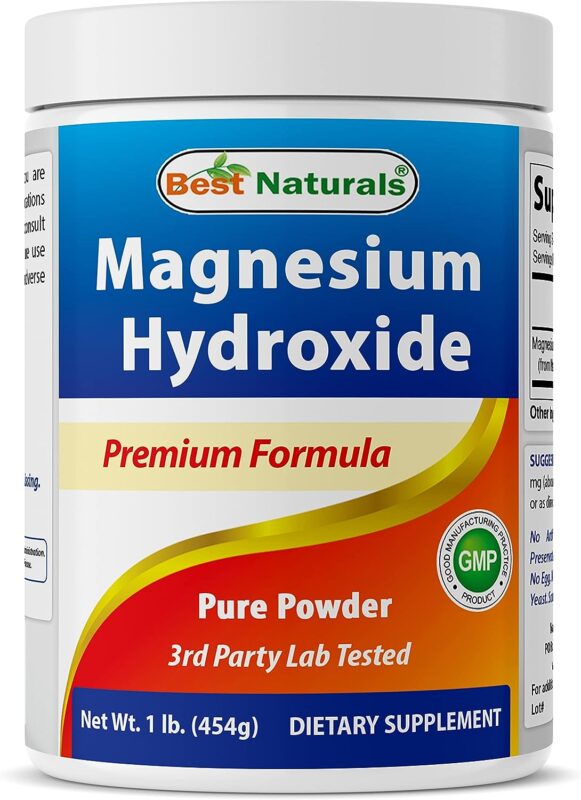
Photo: Amazon
Moving on, we have the Blackmores Super Magnesium Plus. Packed in a convenient 100 capsule bottle, it’s designed for those who desire a straightforward and effective magnesium supplement.

Photo: Amazon
Thirdly, the 11in1 Triple Magnesium Complex Supplement stands out with its unique blend. Comprising magnesium glycinate, malate, citrate, and even spinach leaf, this 15,500 mg powerhouse is crafted to cater to diverse needs, supporting heart, joint, mood, and brain health..
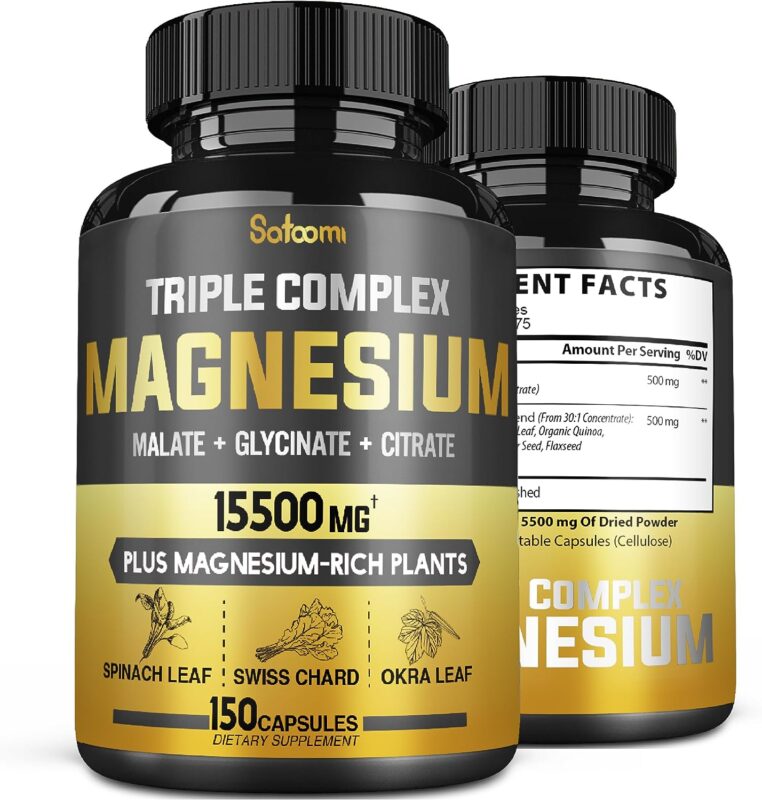
Photo: Amazon
Last but not least, Healthy Care Super Bio Magnesium isn’t just about magnesium; it’s about holistic health. Apart from offering magnesium benefits, it’s specially formulated to relieve mild muscle spasms and maintain muscle health. All these products, each with its unique features, contribute to the puzzle of finding the best magnesium for your needs.
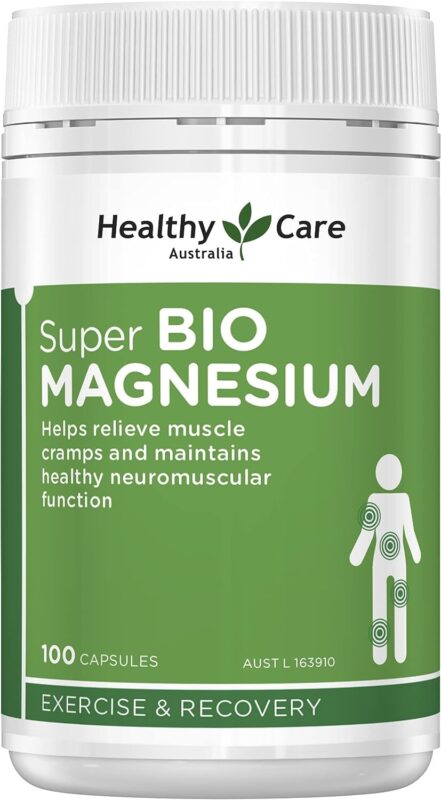
Photo: Amazon
FAQ (Frequently Asked Question)
Q: What are the benefits of magnesium supplements?
A: Magnesium supplements support bone and heart health, improve sleep quality, and help manage anxiety and stress.
Q: How do I choose the right magnesium supplement for me?
A: It’s essential to consider individual nutritional needs, potential health conditions, and desired benefits. Consulting a healthcare professional is advisable.
Q: Are there any side effects of taking magnesium supplements?
A: While generally safe, excessive magnesium intake might cause diarrhea, nausea, and abdominal cramping.
Q: Can magnesium interact with my current medications?
A: Yes, magnesium can interact with certain medications, including antibiotics and diuretics. It’s essential to consult with a healthcare professional before supplementation.
Q: How much magnesium should I take daily?
A: General guidelines recommend a daily dose of 200-400mg for adults, but specific needs may vary
Conclusion
Conclusion: Understanding Magnesium’s Role in Health
One of the key minerals that the human body needs for a variety of physiological processes is magnesium. Its benefits are numerous and diverse, ranging from maintaining bone health and muscle function to controlling neurone activity and enzyme activity.
Magnesium has become known for its potential to treat illnesses like hypertension, anxiety, and sleep disturbances in addition to its fundamental functions. Nevertheless, despite its importance, magnesium insufficiency is still a common problem that is frequently disregarded despite having a significant effect on health.
Fortunately, correcting this shortage has never been simpler because to the wide range of supplements that are now readily available. However, in order to maximise advantages while guaranteeing safety, it is essential to select the proper type of magnesium customised to individual needs and to consult healthcare professionals. In conclusion, magnesium is an essential component of health and deserves more consideration in both everyday diets and therapeutic approaches. It is not just another mineral.
Disclaimer
Please keep in mind that nothing said here should be construed as a substitute for professional medical or financial advice from a qualified financial advisor or a licensed healthcare provider. If you use pharmaceuticals or have concerns after reading the above review information, be sure to speak with a qualified physician or financial expert before making any purchasing decisions. Since the claims made about these products have not been reviewed by the Food and Drug Administration or Health Canada, individual outcomes may differ and cannot be guaranteed. Research that has been approved by the FDA or Health Canada has not attested to the efficacy of these products. These goods do not offer any form of get-rich-quick scheme and are not designed to diagnose, treat, cure, or prevent any ailment. The reviewer disclaims all liability for incorrect pricing. For exact prices, view the product sales page



